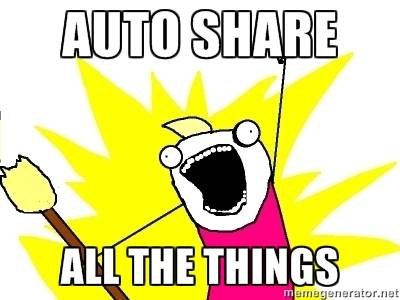If you’ve ever been annoyed with Facebook posts that say, “Your friend just pinned to a board on Pinterest,” or “Selena is listening to Britney Spears on Spotify,” here’s some good news: You’ll be seeing fewer posts like that in the future.
Facebook has given up its dream of having everything you do shared with all your friends. The company is now encouraging developers to eliminate auto-sharing, and provide clear and concise information as to how, exactly, the information collected is being stored and shared.
When Facebook announced Open Graph in 2011—the tool that let developers connect their apps to the social network and automatically share what users were doing to Facebook—the idea was that auto-sharing features would make it easier for users to “tell more of their story,” and share every life detail with friends. While app developers benefitted from explosive growth thanks to Open Graph, many Facebook users weren’t so thrilled.
“We’ve found that people engage more with stories that are shared explicitly rather than implicitly, and often feel surprised or confused by stories that are shared implicitly or automatically,” the company wrote in a blog post Tuesday.
Facebook said it will start burying automatically posted content lower in the news feed because so many users regularly mark auto-shared posts as spam. Instead, the company said, it will focus on prioritizing updates that friends actually took the initiative to share over those generated by an app.
Last week, Facebook disabled automatically sharing likes, comments or posts from Instagram, its flagship photography application. The move marked a big shift in Facebook’s tradition of collecting and sharing as much information as possible. Now it’s pushing developers to stop auto-sharing, too.
A Dream, Crushed

When Open Graph was first announced, application developers loved it, because it helped drive downloads and increased the time people spent on their apps. So everything from Spotify tracks to Nike+ workouts to Pinterest pins ended up on timelines everywhere—but users themselves didn’t share the excitement.
I remember the first time my friends and I downloaded Spotify, only to realize one day later that every track we listened to (including that horribly embarrassing Spice Girls album) appeared on our Facebook profile. As more and more applications began sharing to Facebook, I got in the habit of periodically checking my Facebook timeline to make sure everything on there was explicitly shared, and began reading the fine print before downloading apps.
It wasn’t just entertainment apps that annoyed users; news publications that implemented social reader apps—tools that forced you to opt-in to auto sharing before you could read an article from a participating site—saw a heavy decline in traffic.
In the past few years, many people have become increasingly wary about how much information they share with both friends and Facebook or other third-party mobile apps. Though Facebook has taken strides to clear up its muddled privacy policies and put an increased emphasis on making features opt-in rather than opt-out, some people still don’t trust the social network.
Though if Facebook is willing to admit its auto-sharing practices are flawed, and encourage mobile app developers to stop posting on our walls, we could begin to see a shifting vision from Facebook—one puts people in complete control of their data.
Lead image by Kris Krug; All The Things meme generated by Selena Larson.
















